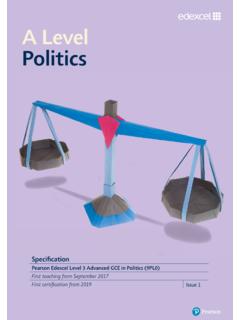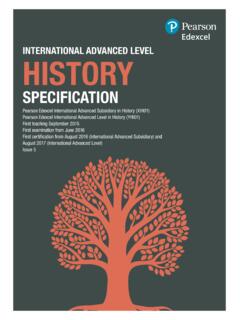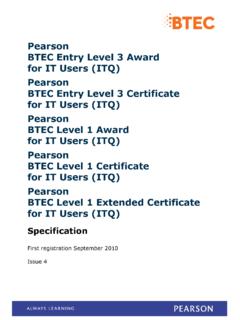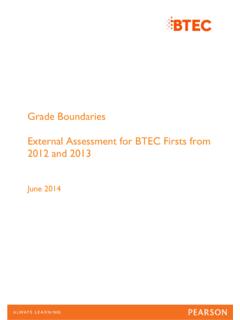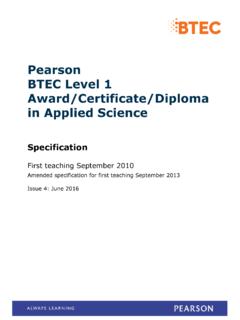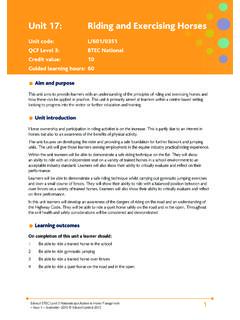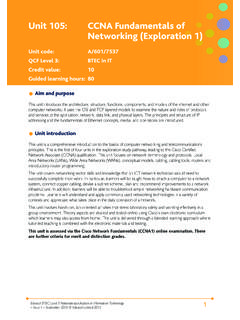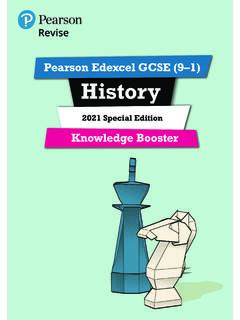Transcription of GCSE (9-1) Psychology - Edexcel
1 gcse (9-1)PsychologySpecificationPearson Edexcel Level 1/Level 2 gcse (9 - 1) in Psychology (1PS0)First teaching from September 2017 First certification from June 2019 Issue 1 Contents 1 Introduction 2 Why choose the Edexcel gcse in Psychology ? 2 Supporting you in planning and implementing this qualification 3 Qualification at a glance 4 2 Subject content 6 Content 7 3 Assessment information 30 Assessment Objectives 32 4 Administration and general information 33 Entries 33 Access arrangements, reasonable adjustments, special consideration and malpractice 33 Student recruitment and progression 36 Appendix 1: Command words used in examination papers 39 Appendix 2: Calculators 40 Appendix 3: The context for the development of this qualification 41 Appendix 4: Transferable skills 43 Appendix 5: Codes 44 Pearson Edexcel Level 1/Level 2 gcse (9 1) in Psychology Specification Issue 1 December 2016 Pearson Education Limited 2016 2 1 Introduction Why choose the Edexcel gcse in Psychology ?
2 We ve listened to feedback from all parts of the Psychology subject community, including higher education. We ve used this opportunity of curriculum change to redesign qualifications that will engage students as they explore human behaviour, get an understanding of themselves and others, and gain skills that will support progression to further study of Psychology and a wide range of other subjects. A wide range of optional topics we re offering the full range of optional topics to make sure that you can meet the specific needs and interests of your students as they develop their understanding of human behaviour. Engaging and contemporary selection of studies we ve carefully selected contemporary and engaging studies relevant to today s student, and highlighted those which are suited to be carried out practically in a classroom setting. Structured around key questions we ve listened to your feedback and will retain the approach you ve told us you like from our current specification: Topics will be structured around key questions, providing a hook for teachers and students.
3 Support with new content to help you plan for 2017 with confidence, we ll provide all the support you need to become familiar with new subject content, research methods and maths skills. Differentiation from A Level we ve considered the progression from gcse to A Level and have differentiated the content where possible to maintain interest in the subject as students progress. Pearson Edexcel Level 1/Level 2 gcse (9 1) in Psychology Specification Issue 1 December 2016 Pearson Education Limited 2016 3 Supporting you in planning and implementing this qualification Planning Our Getting Started guide gives you an overview of the new gcse Psychology qualification to help you to get to grips with the changes to content and assessment and to help you understand what these changes mean for you and your students. We will give you an editable course planner and scheme of work that you can adapt to suit your department. Our mapping documents highlight the key differences between the new and the 2009 qualification.
4 Teaching and learning There will be lots of free teaching and learning support to help you deliver the new qualification, including: topic guides for each of the compulsory and optional topics a guide to support using maths skills as part of research methods a student and parent guide to gcse Psychology . Preparing for exams We will also provide a range of resources to help you prepare your students for the assessments, including: additional assessment materials to support formative assessments and mock exams marked exemplars of student work with examiner commentaries. ResultsPlus ResultsPlus provides the most detailed analysis available of your students exam performance. It can help you identify the topics and skills where further learning would benefit your students. Get help and support Our subject advisor service, led by Julius Edwards, and online community will ensure that you receive help and guidance from us and that you can share ideas and information with other teachers.
5 You can keep up to date with qualification updates and product and service news by signing up to receive e-newsletters from Julius. Email: Learn more at Pearson Edexcel Level 1/Level 2 gcse (9 1) in Psychology Specification Issue 1 December 2016 Pearson Education Limited 2016 4 Qualification at a glance Content and assessment overview The Pearson Edexcel Level 1/Level 2 gcse (9 1) in Psychology consists of two externally-examined papers. Students must complete all assessment in May/June in any single year. Paper 1 (*Paper code: 1PS0/01) Written examination: 1 hour and 45 minutes 55% of the qualification 98 marks Content overview These topics are in Section A of the content. This paper may also draw on knowledge and understanding of investigations from Section C. Topic 1: Development How did you develop? Topic 2: Memory How does your memory work? Topic 3: Psychological problems How would psychological problems affect you? Topic 4: The brain and neuropsychology How does your brain affect you?
6 Topic 5: Social influence How do others affect you? Assessment overview This is a written examination in which all questions must be answered. The paper consists of six sections. The first five sections each cover one of the topics listed above. These sections will include multiple-choice, short-open and open-response questions. The sixth section will contain two extended open-response questions. These questions will focus on debates within Psychology and the interrelationships between the core areas of Psychology . *See Appendix 5: Codes for a description of this code and all other codes relevant to this qualification. Pearson Edexcel Level 1/Level 2 gcse (9 1) in Psychology Specification Issue 1 December 2016 Pearson Education Limited 2016 5 Paper 2 (Paper code: 1PS0/02) Written examination: 1 hour and 20 minutes 45% of the qualification 79 marks Content overview Topics 6 to 10 are optional; students must study two of them. Topic 11 is compulsory. Topic 6: Criminal Psychology Why do people become criminals?
7 Topic 7: The self What makes you who you are? Topic 8: Perception How do you interpret the world around you? Topic 9: Sleep and dreaming Why do you need to sleep and dream? Topic 10: Language, thought and communication How do you communicate with others? Topic 11: Research methods How do you carry out psychological research? Assessment overview Students must answer: All questions from Section A. All questions from two sections B to F. Section A: Research methods How do you carry out psychological research? This section will focus primarily on Topic 11: Research methods How do you carry out psychological research?, although it can draw on material from Topics 1 to 5 from Paper 1. It will contain question types that include calculations, multiple-choice, short-open and open-response questions, and one extended open-response question. Sections B to F: Optional topics Each of these sections covers one of the optional Topics 6 to 10. These sections will include multiple-choice, short-open and open-response questions, and one extended open-response question.
8 Calculators may be used in the examination. Information on the use of calculators during the examinations for this qualification can be found in Appendix 2: Calculators. Pearson Edexcel Level 1/Level 2 gcse (9 1) in Psychology Specification Issue 1 December 2016 Pearson Education Limited 2016 6 2 Subject content Qualification aims and objectives The aims and objectives of this qualification are to enable students to: use specialist vocabulary, psychological concepts, terminology and convention to engage in the process of psychological enquiry acquire knowledge and understanding of Psychology , developing an understanding of self and others, and how psychological understanding can help to explain everyday social phenomena understand how psychological research is conducted, including the role of scientific method and data analysis present information, develop arguments and draw conclusions through a critical approach to psychological evidence, developing as reflective thinkers develop an understanding of the relationship between Psychology and personal, moral, social and cultural issues, and develop an understanding of ethical issues in Psychology develop an understanding of psychological issues, the contribution of Psychology to individual, social and cultural diversity, and how Psychology contributes to society.
9 Knowledge and understanding Students will gain knowledge and understanding of key features of the following core areas of Psychology through the study of the compulsory and optional topics in this specification, including research methods: biological an understanding of biological concepts in Psychology , including neuroscience and genetics as contributors to behaviour cognitive an understanding of thought, information and mental processing as contributors to behaviour social an understanding of the social area of Psychology , the impact of social and environmental factors on behaviour and the influence of groups developmental an understanding of how individuals change throughout their lives, with a particular focus on childhood and how both nature and nurture can affect individuals individual differences an understanding of the complex nature of human behaviour and experiences and why and how people are different. Students will also gain knowledge and understanding of: debates in Psychology , including reductionism/holism and nature/nurture how psychological knowledge and ideas change over time and how they inform our understanding of behaviour the contribution of Psychology to an understanding of individual, social and cultural diversity the interrelationships of the core areas of Psychology how the studies for topics relate to the associated theory research methods.
10 Pearson Edexcel Level 1/Level 2 gcse (9 1) in Psychology Specification Issue 1 December 2016 Pearson Education Limited 2016 7 Content Students are expected to demonstrate and apply the knowledge, understanding and skills described in the content. To demonstrate their knowledge, students should undertake a range of activities, including the ability to recall, describe and define, as appropriate. To demonstrate their understanding, students should explain ideas and use their knowledge to apply, analyse, interpret and evaluate, as appropriate. Students will be expected to demonstrate their understanding of the interrelationships between the core areas of Psychology and issues and debates within them. Students may be asked to consider the following issues when evaluating studies: validity reliability generalisability ethics objectivity subjectivity. The content contains three sections: Section A: Compulsory topics Students must study all topics in this section. These topics will be examined in Paper 1.
